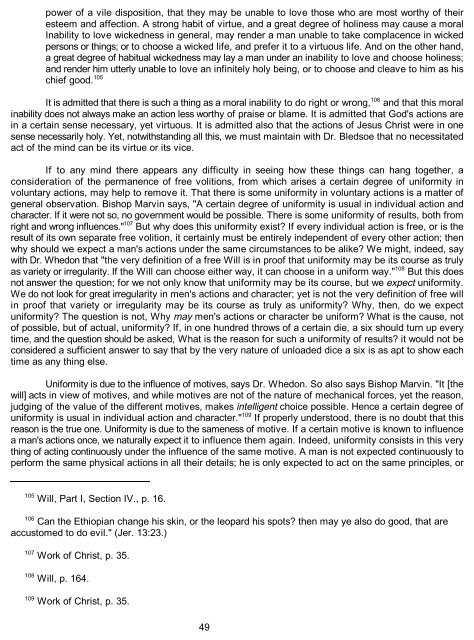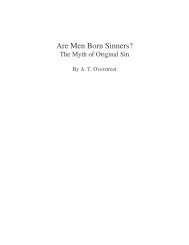Foreknowledge by Joel Hayes - Library of Theology
Foreknowledge by Joel Hayes - Library of Theology
Foreknowledge by Joel Hayes - Library of Theology
You also want an ePaper? Increase the reach of your titles
YUMPU automatically turns print PDFs into web optimized ePapers that Google loves.
105<br />
Will, Part I, Section IV., p. 16.<br />
106<br />
Can the Ethiopian change his skin, or the leopard his spots? then may ye also do good, that are<br />
accustomed to do evil." (Jer. 13:23.)<br />
107<br />
108<br />
109<br />
power <strong>of</strong> a vile disposition, that they may be unable to love those who are most worthy <strong>of</strong> their<br />
esteem and affection. A strong habit <strong>of</strong> virtue, and a great degree <strong>of</strong> holiness may cause a moral<br />
Inability to love wickedness in general, may render a man unable to take complacence in wicked<br />
persons or things; or to choose a wicked life, and prefer it to a virtuous life. And on the other hand,<br />
a great degree <strong>of</strong> habitual wickedness may lay a man under an inability to love and choose holiness;<br />
and render him utterly unable to love an infinitely holy being, or to choose and cleave to him as his<br />
chief good. 105<br />
106<br />
It is admitted that there is such a thing as a moral inability to do right or wrong, and that this moral<br />
inability does not always make an action less worthy <strong>of</strong> praise or blame. It is admitted that God's actions are<br />
in a certain sense necessary, yet virtuous. It is admitted also that the actions <strong>of</strong> Jesus Christ were in one<br />
sense necessarily holy. Yet, notwithstanding all this, we must maintain with Dr. Bledsoe that no necessitated<br />
act <strong>of</strong> the mind can be its virtue or its vice.<br />
If to any mind there appears any difficulty in seeing how these things can hang together, a<br />
consideration <strong>of</strong> the permanence <strong>of</strong> free volitions, from which arises a certain degree <strong>of</strong> uniformity in<br />
voluntary actions, may help to remove it. That there is some uniformity in voluntary actions is a matter <strong>of</strong><br />
general observation. Bishop Marvin says, "A certain degree <strong>of</strong> uniformity is usual in individual action and<br />
character. If it were not so, no government would be possible. There is some uniformity <strong>of</strong> results, both from<br />
107<br />
right and wrong influences." But why does this uniformity exist? If every individual action is free, or is the<br />
result <strong>of</strong> its own separate free volition, it certainly must be entirely independent <strong>of</strong> every other action; then<br />
why should we expect a man's actions under the same circumstances to be alike? We might, indeed, say<br />
with Dr. Whedon that "the very definition <strong>of</strong> a free Will is in pro<strong>of</strong> that uniformity may be its course as truly<br />
108<br />
as variety or irregularity. If the Will can choose either way, it can choose in a uniform way." But this does<br />
not answer the question; for we not only know that uniformity may be its course, but we expect uniformity.<br />
We do not look for great irregularity in men's actions and character; yet is not the very definition <strong>of</strong> free will<br />
in pro<strong>of</strong> that variety or irregularity may be its course as truly as uniformity? Why, then, do we expect<br />
uniformity? The question is not, Why may men's actions or character be uniform? What is the cause, not<br />
<strong>of</strong> possible, but <strong>of</strong> actual, uniformity? If, in one hundred throws <strong>of</strong> a certain die, a six should turn up every<br />
time, and the question should be asked, What is the reason for such a uniformity <strong>of</strong> results? it would not be<br />
considered a sufficient answer to say that <strong>by</strong> the very nature <strong>of</strong> unloaded dice a six is as apt to show each<br />
time as any thing else.<br />
Uniformity is due to the influence <strong>of</strong> motives, says Dr. Whedon. So also says Bishop Marvin. "It [the<br />
will] acts in view <strong>of</strong> motives, and while motives are not <strong>of</strong> the nature <strong>of</strong> mechanical forces, yet the reason,<br />
judging <strong>of</strong> the value <strong>of</strong> the different motives, makes intelligent choice possible. Hence a certain degree <strong>of</strong><br />
109<br />
uniformity is usual in individual action and character." If properly understood, there is no doubt that this<br />
reason is the true one. Uniformity is due to the sameness <strong>of</strong> motive. If a certain motive is known to influence<br />
a man's actions once, we naturally expect it to influence them again. Indeed, uniformity consists in this very<br />
thing <strong>of</strong> acting continuously under the influence <strong>of</strong> the same motive. A man is not expected continuously to<br />
perform the same physical actions in all their details; he is only expected to act on the same principles, or<br />
Work <strong>of</strong> Christ, p. 35.<br />
Will, p. 164.<br />
Work <strong>of</strong> Christ, p. 35.<br />
49






